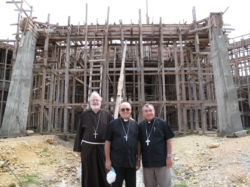From Cardinal Seán’s blog
Last week, I traveled to Cuba with a delegation sent by the United States Conference of Catholic Bishops. Father Andrew Small, the secretary for Latin America who administers the annual collection to help projects in the churches in that part of the world, was in charge of this delegation.
The delegation was made up of Bishop Oscar Cantu, the Auxiliary Bishop of San Antonio; Bishop Thomas Wenski, who is the chairperson of the bishop’s Migration and International Policy Committee; and I as a member of the committee on Latin America. My secretary, Father Jonathan Gaspar also accompanied us as staff.
We were there to give support to the local bishops and to become acquainted first-hand with how the aid we sent after last year’s three hurricanes and two tropical storms is being used. We also sought to better understand what their future needs are.
We had meetings with the bishops, lay leaders and the staff from Caritas Cubana, the Church organization in Cuba which helps the sick and the elderly and also provides emergency relief services.
I want to mention that here in Boston there is an organization, The Friends of Caritas Cubana, that supports their efforts. Each year there is a fundraiser at the home of Consuelo Isaacson, and usually a member of Caritas or one of the Cuban bishops will attend.
We had interesting meetings with representatives of the government. We discussed how relations between our two countries might improve. We talked about people’s attitudes toward the embargo.
We also spoke about the issue of political prisoners. I raised the question of Dr. Oscar Biscet who has been imprisoned and sentenced to many years, ostensibly because of his opposition to abortion in Cuba.
For their part, the Cuban government wanted to make it known they are upset with the fact that some of the wives of five Cubans who were imprisoned in the U.S. in 2001 have not been given visas to visit their husbands.
So, we had substantial discussions about difficult topics but, all in all, I think that there has been some movement.
Obviously, the U.S. bishops and the Holy See have urged the lifting of the embargo many years ago. And we talked about the help that is given to the Cuban Church by the Catholics in the United States and our gratitude for that. The Catholics in Boston are really the most generous in support of these missions, which may have been one of the reasons I was asked to be part of this delegation.
I have been going to Cuba for the last 25 years at different intervals, and each time I have seen progress. Certainly, the watershed moment was the Holy Father’s visit. In fact, when I went back and visited the seminaries, 90 percent of the seminarians were converts, and they attributed their conversion to the Holy Father’s visit. The number of practicing Catholics is very limited. One of the things I raised with the government was the need for the Church to be able to build new churches in areas that have been developed since the time of the revolution where there are no places of worship.



















